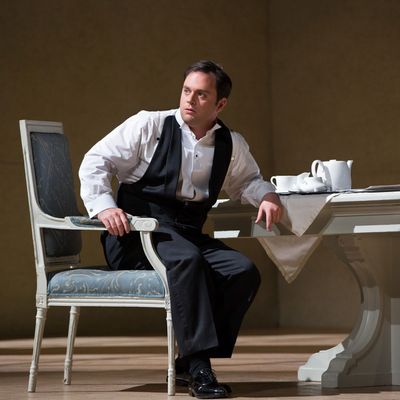
Having hauled The RakeÔÇÖs Progress out of deep storage, the Metropolitan Opera is doing the showbiz equivalent of blinding your math teacher by bouncing sunlight off a watch face. A few quick dazzles and the opera will get tucked back out of sight, leaving the aftershock of brilliance dancing on the retina. (ThereÔÇÖs one more performance on Saturday.) Jonathan MillerÔÇÖs 1997 production has hardly aged at all, and here it gets a shot of rejuvenating energy from a fresh and flawless cast.
The strongest link is Paul Appleby, the apple-cheeked, honey-voiced tenor who takes the character of Tom Rakewell from puppy in a sweater-vest through bitter rou├® to delusional inmate, finding a consistent hollowness within that enormous range. In the operaÔÇÖs moralistic universe, Tom pays an awful price for being a greedy, shortsighted fool who learns too late how to love. (In real life, such people are elected to public office.) But Appleby makes us want to spend an evening in his company because he handles StravinskyÔÇÖs neo-Mozartian music with a deep understanding of both Mozart and Stravinsky, because he infuses a cool score with restrained despair, and because he sings with such irresistible clarity. The Met is better known for showcasing made-in-Europe superstars than for nurturing its own, but Appleby came out of the companyÔÇÖs Lindemann Young Artist Development Program and has patiently worked his way up to star status. The MetÔÇÖs general manager Peter Gelb should not only be planning productions around him for the foreseeable future but might also consider tattooing a picture of the guy on his biceps.
On second thought, perhaps ApplebyÔÇÖs not the best thing about this show: Maybe itÔÇÖs Stephanie Blythe, who sashays through the role of Baba the Turk with her opulent mezzo and the timing of a born comedienne. Or Gerald Finley, who sings Nick Shadow with unctuous charm and a chocolate baritone. Or Peter DavisonÔÇÖs deceptively pared-down and lightly surrealistic sets. Even the imperfections are appealing. The librettists, W.H. Auden and Chester Kallman, made Ann Trulove inert and blandly pure, but Stravinsky gave her some lovely arias, and Layla Claire sings ÔÇ£No Word From TomÔÇØ with the touching, grass-fed tenderness of a plain country girl.
The RakeÔÇÖs Progress is one of those operas, along with BergÔÇÖs Lulu and DebussyÔÇÖs Pelleas et M├®lisande, that the MetÔÇÖs music director James Levine does for love and the Met does out of love for James Levine. Accordingly, the orchestra doesnÔÇÖt get a crack at Stravinsky very often, and Levine doesnÔÇÖt draw out the diamond-edge glitter and fierce precision with which heÔÇÖs set a global standard. Instead, he brings out the scoreÔÇÖs plasticity, its vocal breath, and neoclassical elegance. As a result, there wasnÔÇÖt always total agreement about when to play what, or how quickly, or how loud. Still, since LevineÔÇÖs the one plugging for this problematic masterpiece and attending to all those other musical marvels, he gets to leave the occasional air bubble in the glaze.


